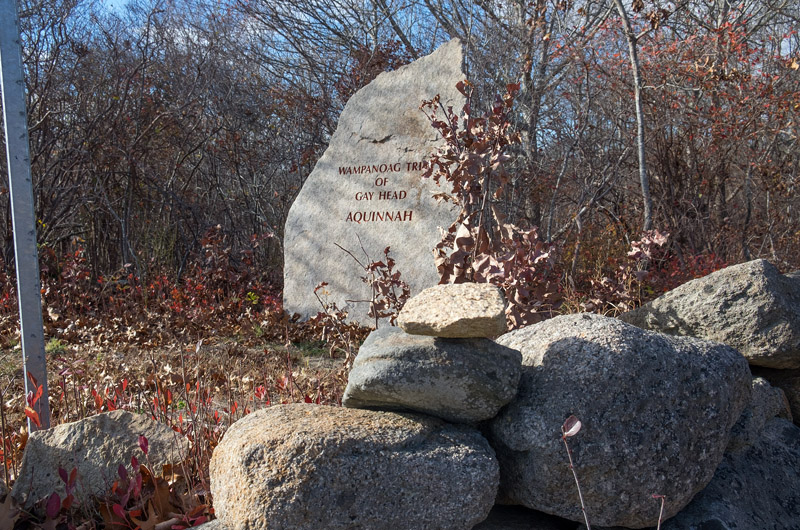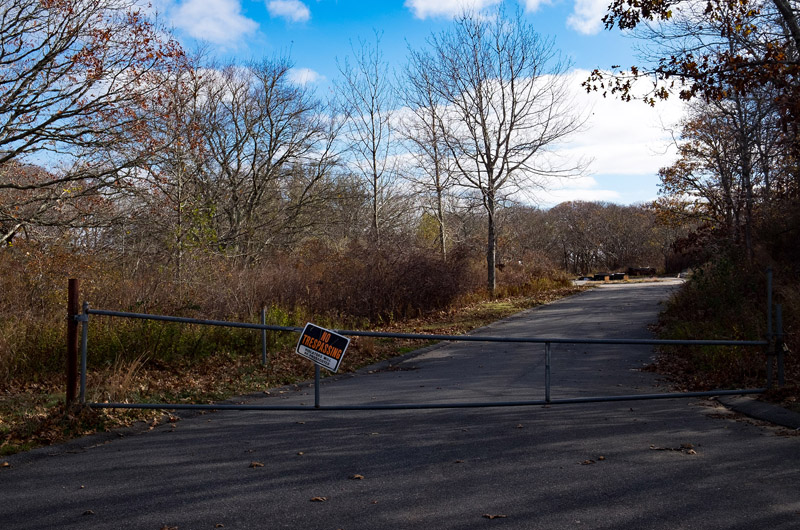As it turns out, a gambling facility is not in Martha’s Vineyard’s foreseeable future.
A federal judge has rejected legal arguments by the Wampanoag Tribe of Gay Head (Aquinnah) that it has the right to open a class II casino, which features electronic bingo machines, on tribal land at the western tip of the Island.
The decision on Nov. 13 by U.S. District Judge F. Dennis Saylor 4th was a sweeping legal victory for the town of Aquinnah, the state and the Aquinnah/Gay Head Community Association, which argued that the tribe must submit to local and state gambling prohibitions. Tribal leaders said they were considering their options — an appeal is expected — but their legal effort to convert a vacant and unfinished community center to a gambling hall now faces a steeper hill to climb. Only last July, they had expressed hopes of opening the gaming hall by the end of the year.
In his 40-page ruling, Judge Saylor effectively dashed those hopes, and jeopardized plans to ever open the doors to gaming facility in Aquinnah. He found that the tribe does not exert “sufficient governmental power” over its own land to qualify for such an operation under the Indian Gaming Rights Act, a law passed by Congress in 1988 establishing a regulatory framework for gaming on Indian land.
For example, the tribe does not provide its own independent police, fire and emergency services, and did not show evidence of enough responsibility for other services, the judge wrote.
More significantly, the judge said the Indian Gaming Regulatory Act does not invalidate the Massachusetts Settlement Act, the 1987 law passed by Congress that among other things gave the Wampanoag tribe 485 acres of land in Gay Head (today Aquinnah), but also required compliance with state and local laws, including prohibitions on gambling.
In effect, the tribe “cannot build a gaming facility on the settlement lands without complying with the laws and regulations of the commonwealth and the town,” the judge wrote in granting summary judgment to the state, the town and the community association.
Aquinnah town counsel Ronald H. Rappaport called the decision an important victory. “The judge explicitly held that there is no right to game on any settlement lands, and the only settlement lands the tribe has are in Aquinnah,” he said, adding: “What this decision means is no gaming in Aquinnah. This is a great result for the town and for the Island.”
Massachusetts Attorney General Maura Healey issued a short statement praising the decision. “We think the judge got it right and we appreciate his thoughtful, careful ruling,” the statement said.
And Larry Hohlt, president of the community association, called it gratifying. “One would hope that this thorough and well-reasoned decision will bring this matter to a close,” he said in an email.
In a statement issued Monday, tribal chairman Tobias Vanderhoop took a different view. “I am dismayed with the ruling by Judge Saylor, as it directly impacts the tribe’s ability to pursue a proven economic development path that has positively impacted many federally-recognized Indian tribes,” Mr. Vanderhoop said. “The tribal council’s next step is to fully review the ruling, its implications and all options including an appeal with our legal team. We believe that the exercise of our governmental authority is inherent in the intergovernmental agreements that we have chosen to establish and we will pursue a course of action that will defend our rights and status as a tribal government. Meanwhile, the tribe will continue to pursue opportunities that enhance its ability to govern and provide for the needs of our citizens.”
A statement issued by the tribal council and the tribe’s gaming corporation called a decision “a terrible mistake that demonstrates a complete lack of understanding of the history of all tribes in this country and their status as sovereign governments . . . . Before the great Wampanoag nation met the invading pilgrims and offered them amnesty, they were a government, as they remain today. The decision a government makes to work collaboratively with another government is the very definition of exercise of governmental authority,” said the statement, issued by Scott Crowell, who has represented the tribe in the litigation.
The legal setback throws a wrench into tribal leadership’s plans to tap into casino revenue to promote its economic development and fund various tribal programs. The gambling issue also has divided the tribe, with many Island members rejecting a casino but off-Island members showing significant support.
Coincidentally the court ruling came two days before the quarterly general membership meeting of the tribe. Speaking to the Gazette Monday, tribal member Donald Widdiss said about 50 people attended the meeting Sunday, and the court decision was discussed. “The upshot was that they are obviously not prepared to even begin to make a decision as to what the next step will be,” he said. “The judge pretty much took care of the basic issues,” he added, noting the thoroughness of the decision. He also said the ruling came as little surprise. “You would have to be living in a cave not to understand that it was at best a long shot,” said Mr. Widdiss, a casino opponent.
Juli Vanderhoop, a tribal member and Aquinnah selectman, said reaction was widespread over the weekend. “I have heard a lot of great response from people around the community, and then the tribal community as well,” she said. “A lot of relief.” She did not believe the casino efforts had weakened town-tribe relations. “I think that some of the people really thought that this was the key to our economic success. But I think that we are no worse off than we were going in. I don’t think that there were hard feelings,” she said.
At the town selectmen’s meeting Tuesday night, Ms. Vanderhoop and the two other selectmen expressed relief — and hope that the town and tribe could look beyond the casino fight. “I think the town and its voters are happy with the outcome of Judge Saylor’s decision,” said chairman Spencer Booker, who like Ms. Vanderhoop is also a tribe member. “I hope it’s a signal for us all to be able to just move forward now as a town and tribe.” Added selectman Jim Newman: “This was a big issue, but it was not a divisive issue in terms of the town of Aquinnah. All the residents were behind it. So that makes it even better.”
Narrow Issues of Law
The ruling dealt with cross motions for summary judgment — a judicial decision short of a trial, based on an agreed set of facts and prevailing law.
The decision recounts the complicated background in the case that dates to 1983 when the tribe, the state, the town of Gay Head and a taxpayer group that was the predecessor to the community association signed the land claims settlement agreement that was a decade in the making. The agreement was ratified by the Massachusetts legislature in 1985 and adopted by Congress in 1987. The agreement subjected the tribe to state and town civil and criminal laws; Congress added language that includes the right to regulate or prohibit “the conduct of bingo or any other game of chance.” This language became pivotal in the gambling litigation — and in Judge Saylor’s decision — nearly three decades later.
The judge found that IGRA and the settlement act don’t necessarily clash, because IGRA allows for gambling restrictions if they are specifically included in another federal law, and the language in settlement act does exactly that. In fact, because IGRA and the settlement act were endorsed by the same Congress, legislative history suggests that lawmakers intentionally exempted the tribe’s law from some provisions of IGRA, he said.
“The two statutes are not merely capable of co-existence; rather, both can be given full effect,” the judge wrote. “IGRA permits tribes to engage in class II gaming on their land unless it is specifically prohibited by federal law . . . . When Congress passed IGRA, the settlement act was an existing federal law that specifically prohibited gaming on the settlement lands.”

Earlier in the decision he summed up the issue: “If the 1988 law [IGRA] controls, the tribe can build a gaming facility in Aquinnah. If the 1987 law controls, it cannot.”
The ruling also exhaustively examines pertinent case law, including one case involving a native American tribe in Rhode Island and another in Maine.
Ultimately Judge Saylor noted his role was to rule on narrow legal issues, leaving the broader questions about legalized gambling to the political system.
“Whether an Indian tribe should be permitted to operate a casino on Martha’s Vineyard is a matter of considerable public interest,” he wrote. “This lawsuit is not, however, about the advisability of legalized gambling. Nor is it about the proper course of land development on Martha’s Vineyard, or how best to preserve the unique environment and heritage of the Island. And it is not about the appropriate future path for the Wampanoag people.
“If there are answers to those questions, they are properly left to the political branches in our system of government. The role of the court here is a narrow one, and it expresses no opinion of any kind about the broader issues underlying this dispute.”
Long Road for the Tribe
The judge’s decision is the latest development in a tortuous path by the tribe to secure some form of gambling, either on the Island or on the mainland. In 1994 the tribe signed an agreement with Gov. William Weld to develop a $175 million casino in New Bedford, but that effort died in the legislature a few years later. In 2012, Gov. Deval Patrick signed a compact with the Mashpee Wampanoags, not the Aquinnah tribe, to develop a casino project in southeastern Massachusetts. The same year, tribe members voted approval for a class II (electronic bingo) facility in Aquinnah. That eventually prompted the Patrick administration to file a lawsuit in late 2013 to block the bingo operation. The state asserted that the tribe had forfeited any right to operate a casino on its Vineyard lands when it signed the settlement agreement. The tribe successfully petitioned to move the lawsuit from state court to federal court, and the town of Aquinnah and the Aquinnah/Gay Head Community Association joined the state’s side opposing the casino.
The site of the proposed casino is a 6,500-square-foot unfinished and unused community center, built with the help of $1.1 million in Housing and Urban Development funds, and the labor of three Air Force reserve squadrons. (The tribe has said it will re-pay those funds because the use of the structure would change to a gaming facility; talks are now underway to extend a mid-December deadline, a HUD official said last week.) This past summer, tribal leaders left no doubt about their intention to push ahead to open the casino as soon as possible. Mr. Vanderhoop and Cheryl Andrews-Maltais, head of the tribe’s gaming corporation, told the Gazette in early July that they planned to open the casino by the end of the year. “As soon as possible,” said Ms. Andrews-Maltais.
Work at the community center site prompted the town to issue a cease and desist letter to halt any construction, an order the tribe said it was not obligated to honor. The town then gained an injunction from Judge Saylor barring any work, at least until he could rule on the underlying legal issues.
The decision and any appeals promise to produce political, economic and social consequences for the tribe’s members — most of whom live off-Island — and for the town of Aquinnah, its residents and even the rest of the Island. Opponents within the tribe say the casino will disrupt a sacred way of life for them, a factor that has not been fully appreciated by members who don’t live on the Vineyard. Some opponents agree that while the tribe has the right to establish a gambling operation, it should not assert that right for an Island facility. They also say a gaming operation in Aquinnah will attract an unsavory element to the former community center, which sits near tribal housing for families, including children. The strain on the town’s infrastructure — including police, traffic and other support services — could be significant. Beyond that, opening a casino would signal a rupture between the tribe and the town itself, despite efforts on both sides to build trust and cooperation over the years, according to town officials and some residents. And some Island residents outside of Aquinnah have suggested that a glitzy, quick-bucks gaming culture clashes with the Island ethic that values its natural beauty and culture.
Casino proponents have painted a far different picture. The tribe is simply asserting its sovereignty through the gambling project, and is struggling to establish its self-sufficiency, instead of relying on handouts from the federal government, tribal leaders say. They point to a consultant’s report projecting the casino’s annual net income ranging between $4.5 million and $5 million over the first three years. “The development of a gaming operation is the best option we currently have to create a revenue stream outside of federal funding,” tribal chairman Tobias Vanderhoop said in a court document. Casino revenue, he added, would help expand “elders programs, youth programs, court system, law enforcement, education, health care, cultural activities, housing, historic preservation, and environmental protection and will create others such as Head Start programs, language reclamation classes, and additional economic development opportunities.”
A promotional brochure circulated by the Aquinnah Wampanoag Gaming Corporation, the gaming arm of the tribe, says the structure would be expanded to 9,000 square feet and feature about 300 gaming machines. The booklet also referred to the casino as Aquinnah Cliffs and promised a building that will blend in with its surroundings. The operation would create 100 to 130 jobs, according to the booklet, although one gambling industry expert said similar operations create far fewer positions, in part because of the automated nature of such casinos.
The twists and turns over the project have included two unsuccessful tribal membership votes to reverse the casino effort, most recently in August, when the vote was 110-110 deadlock. Casino opponents needed a two-thirds majority to prevail.






Comments (4)
Comments
Comment policy »